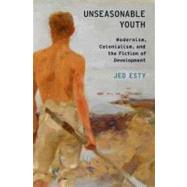Unseasonable Youth Modernism, Colonialism, and the Fiction of Development
, by Esty, Jed- ISBN: 9780199857968 | 0199857962
- Cover: Hardcover
- Copyright: 11/4/2011
Unseasonable Youthexamines a range of modernist-era fictions that cast doubt on the ideology of progress through the figure of stunted or endless adolescence. Novels of youth by Oscar Wilde, Olive Schreiner, Rudyard Kipling, Joseph Conrad, H.G. Wells, James Joyce, Virginia Woolf, Jean Rhys, and Elizabeth Bowen disrupt the inherited conventions of the bildungsroman in order to criticize bourgeois values and to reinvent the biographical plot, but also to explore the contradictions inherent in mainstream developmental discourses of self, nation, and empire. The intertwined tropes of frozen youth and uneven development, as motifs of failed progress, play a crucial role in the emergence of dilatory modernist style and in the reimagination of colonial space at the fin-de-siècle. The genre-bending logic of uneven development - never wholly absent from the coming-of-age novel -- takes on a new and more intense form in modernism as it fixes its broken allegory to the problem of colonial development. In novels of unseasonable youth, the nineteenth-century idea of world progress comes up against stubborn signs of underdevelopment and uneven development, just at the same moment that post-Darwinian racial sciences and quasi-Freudian sexological discourses lend greater influence to the idea that certain forms of human difference cannot be mitigated by civilizing or developmental forces. In this historical context, the temporal meaning and social vocation of the bildungsroman undergo a comprehensive shift, as the history of the novel indexes the gradual displacement of historical-progressive thinking by anthropological-structural thinking in the Age of Empire.







